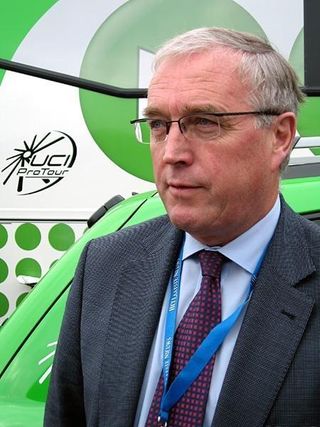UCI welcomes Valverde decision, says justice has been done
McQuaid wants to look forward, not back

Four years after vowing that the riders involved in Operación Puerto would be brought to justice, UCI president Pat McQuaid has finally seen Alejandro Valverde incur a worldwide ban for doping.
On Monday, the Spaniard was deemed guilty of a doping offence by the Court of Arbitration for Sport (CAS) and was handed a two year suspension.
McQuaid has long stated that he believes Valverde was indeed linked to the controversial doctor Eufemiano Fuentes and now, after many efforts to push the case forward, he has got the result that he felt is right.
"We are pleased it is over and done with," McQuaid told Cyclingnews this evening. "We have always felt that he was involved in Puerto and CAS has now shown that to be correct. We are pleased this is behind us. The guy has used and abused the system for the past four years and were glad now that CAS has defended both the UCI and WADA's position on this."
However, while celebrating this victory, McQuaid indicated that he wanted to move on from the subject which has plagued the UCI since 2007.
"Let's move forward. As president of the UCI, I prefer to look forward to the cycling of today and the cycling of tomorrow, rather than the cycling of yesterday and years gone by. And that includes Floyd Landis and what have you."
The CAS ruling determined that while Valverde was involved in doping prior to the Operación Puerto raids in May 2006, that there was no evidence that he has doped in the years since. As a result of that, it rejected the push by WADA and the UCI to have all his results since Puerto crossed off.
Get The Leadout Newsletter
The latest race content, interviews, features, reviews and expert buying guides, direct to your inbox!
Valverde will lose some prize money and points, but these will only pertain to races held this year.
Cyclingnews asked McQuaid if he could understand the reasoning behind that aspect of the CAS decision.
"I can see the logic of it," he conceded. "He rode those races, he was tested many times. He was in the bio passport and there are no indications that he had been doping over the past couple of years.
"He was certainly involved in Puerto and that has come back to haunt him. That is a message for any cyclist today - if he decides to get involved in a doping programme, that it may eventually come back to haunt him. There is no statute of limitations in relation to that, so it is a good lesson from that point of view.
"This is something that Valverde got involved with before 2006 and has now eventually caught up with him. From the point of view of natural justice, that is a good thing."
Most Popular

